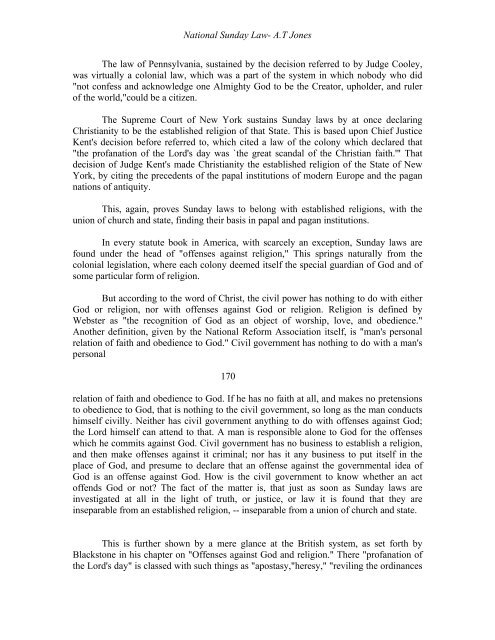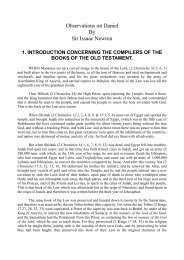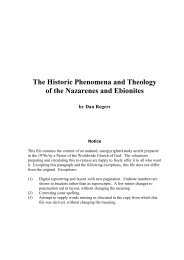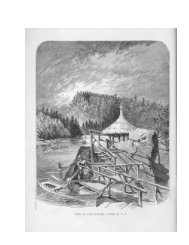THE NATIONAL SUNDAY LAW, ARGUMENT OF ALONZO T ...
THE NATIONAL SUNDAY LAW, ARGUMENT OF ALONZO T ...
THE NATIONAL SUNDAY LAW, ARGUMENT OF ALONZO T ...
You also want an ePaper? Increase the reach of your titles
YUMPU automatically turns print PDFs into web optimized ePapers that Google loves.
National Sunday Law- A.T Jones<br />
The law of Pennsylvania, sustained by the decision referred to by Judge Cooley,<br />
was virtually a colonial law, which was a part of the system in which nobody who did<br />
"not confess and acknowledge one Almighty God to be the Creator, upholder, and ruler<br />
of the world,"could be a citizen.<br />
The Supreme Court of New York sustains Sunday laws by at once declaring<br />
Christianity to be the established religion of that State. This is based upon Chief Justice<br />
Kent's decision before referred to, which cited a law of the colony which declared that<br />
"the profanation of the Lord's day was `the great scandal of the Christian faith.'" That<br />
decision of Judge Kent's made Christianity the established religion of the State of New<br />
York, by citing the precedents of the papal institutions of modern Europe and the pagan<br />
nations of antiquity.<br />
This, again, proves Sunday laws to belong with established religions, with the<br />
union of church and state, finding their basis in papal and pagan institutions.<br />
In every statute book in America, with scarcely an exception, Sunday laws are<br />
found under the head of "offenses against religion," This springs naturally from the<br />
colonial legislation, where each colony deemed itself the special guardian of God and of<br />
some particular form of religion.<br />
But according to the word of Christ, the civil power has nothing to do with either<br />
God or religion, nor with offenses against God or religion. Religion is defined by<br />
Webster as "the recognition of God as an object of worship, love, and obedience."<br />
Another definition, given by the National Reform Association itself, is "man's personal<br />
relation of faith and obedience to God." Civil government has nothing to do with a man's<br />
personal<br />
170<br />
relation of faith and obedience to God. If he has no faith at all, and makes no pretensions<br />
to obedience to God, that is nothing to the civil government, so long as the man conducts<br />
himself civilly. Neither has civil government anything to do with offenses against God;<br />
the Lord himself can attend to that. A man is responsible alone to God for the offenses<br />
which he commits against God. Civil government has no business to establish a religion,<br />
and then make offenses against it criminal; nor has it any business to put itself in the<br />
place of God, and presume to declare that an offense against the governmental idea of<br />
God is an offense against God. How is the civil government to know whether an act<br />
offends God or not? The fact of the matter is, that just as soon as Sunday laws are<br />
investigated at all in the light of truth, or justice, or law it is found that they are<br />
inseparable from an established religion, -- inseparable from a union of church and state.<br />
This is further shown by a mere glance at the British system, as set forth by<br />
Blackstone in his chapter on "Offenses against God and religion." There "profanation of<br />
the Lord's day" is classed with such things as "apostasy,"heresy," "reviling the ordinances
















